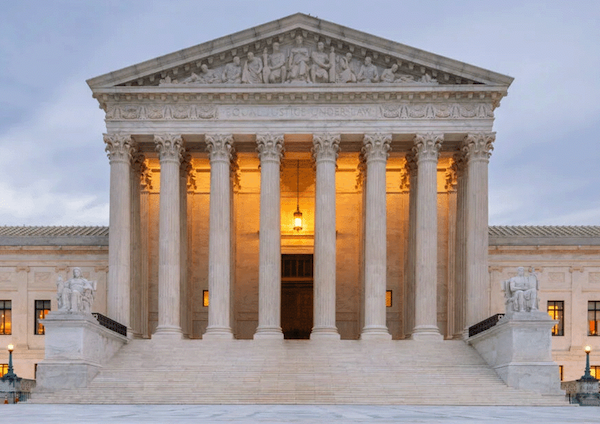 Supreme Court Rulings May Be Most Impactful in Years
Supreme Court Rulings May Be Most Impactful in Years
In June and early July, the Supreme Court of the United States (SCOTUS) issued rulings that were substantial in matters ranging from the first amendment to presidential immunity to the power of the federal bureaucracy.
The cases that mattered most are discussed below.
In one of their final decisions, on July 1, the court ruled 6-3 in favor of presidential immunity for presidents performing official acts. What constitutes an official act versus unofficial acts continues to be a grey area, though the decision in Trump v. United States [PDF] sets a reasonable standard for the behavior of the nation's chief executive.
Writing for the majority, Chief Justice John Roberts explained in his 43-page ruling that presidents have absolute immunity for their official acts when those acts relate to the core powers granted to them by the Constitution -- for example, the power to issue pardons, veto legislation, recognize ambassadors, and make appointments.
Concerning a president's other, less obvious official acts, Roberts continued, "a president inclined to take one course of action based on the public interest may instead opt for another, apprehensive that criminal penalties may befall him upon his departure from office."
Taking a circumspect view, Roberts noted that the public has an interest in "fair and effective" enforcement of criminal laws, but the Chief Justice left it up to lower courts and prosecutors to administer justice and bring changes against former presidents. He did, however, issue a directive of sorts, advising that courts cannot consider the president's motives, nor can they designate an act as unofficial simply because it allegedly violates the law. This is a common sense approach, something the minority opinion of Justices Sonia Sotomayor, Elena Kagan, and Ketanji Brown Jackson, countered with the usual short-sighted polemic, saying that if a future president, "misuses official power for personal gain, the criminal law that the rest of us must abide will not provide a backstop."
Obviously, Justice Sotomayor meant "former" president not "future" as the court's decision will weigh heavily on current prosecutions aimed at derailing the candidacy of one Donald J. Trump.
Justice Clarence Thomas, in a separate concurring opinion, was straightforward, noting that no president except Trump has faced criminal prosecution for acts while in office in the more than 200 years since the founding of the republic.
In its most essential application, the court's ruling on presidential immunity was a win for Trump, but it also shielded the current White House occupant, Joe Biden, from potential prosecution, as well as his predecessors, Barack Obama, George W. Bush, and Bill Clinton, from being charged with crimes stemming from various actions they took while in office.
The court's 6-3 split ruling, thankfully gives presidents the latitude they need to make decisions that often affect not just the whole country, but much of the rest of the world as well.
Two states - Louisiana and Missouri - and five individual social media users sued dozens of Executive Branch officials and agencies, alleging that the Government pressured the platforms to censor their speech in violation of the First Amendment.
The court's ruling in favor of the government, by denying standing to the plaintiffs, was a serious abdication of responsibility by the six justices who were in the majority.
Dissenting was Justice Samual Alito, who was joined by first amendment advocates Clarence Thomas and Neil Gorsuch, alleged that the states and individuals did indeed have standing before the court and that "the White House coerced Facebook into censoring" at least one plaintiff's speech.
The case focused around dis- and misinformation surrounding the COVID-19 vaccine and the government's attempts to stifle opposing opinions that the treatments were "safe and effective" among other half-truths and what most people have come to find were outright lies.
Sending the matters back to lower courts and erecting "standing" test barriers that exceed normal standards puts free speech in a more precarious position than it ever has been. If the government believes it has a free hand to hold over the mouth of its citizens, what's to stop it from using it to propagandize the public in manners and matters that flay against the grain of honest, forthright public policy?
The court's decision to sidestep this most important issue leaves open the door for social media platforms and all other forms of communication to become corrupted by government operatives (essentially the CIA, FBI, and DOJ) who seek to instill fear or otherwise influence public opinion in favor of their policies, whether good intentioned or ill.
First Amendment protection is there because it is necessary to the safe functioning of a legitimate democratic government. The Supreme Court failed in its rather devoid of substance findings that the plaintiffs lacked the ability - standing - to appear and argue their positions.
The "lacks standing" argument was used extensively in cases surrounding the 2020 election, which many claim was corrupted at least and stolen at worst. Avoiding important issues is not what the Founders intended for the Supreme Court. Rather, they saw the court as the people's last and most powerful weapon against tyranny and overreach by government.
This ruling guarantees that First Amendment issues will reach the Supreme Courts dockets in the future. Perhaps a less-charged political climate or a different set of facts may sway the court to at least hear such cases.
In Loper Bright Enterprises v. Raimondo [PDF], heard together with Relentless v. Dept. of Commerce the court overturned a 40-year-old precedent known as the Chevron deference that gave federal agencies far-reaching, and, likely, undeserved authority.
By a vote of 6-3, the justices overruled their landmark 1984 decision in Chevron v. Natural Resources Defense Council, which gave rise to the doctrine known as the Chevron doctrine or deference. Under that doctrine, if Congress has not directly addressed the question at the center of a dispute, a court was required to uphold the agency's interpretation of the statute as long as it was reasonable. But in a 35-page ruling by Chief Justice John Roberts, the justices rejected that doctrine, calling it "fundamentally misguided."
As usual, in cases in which government power is curtailed or significantly impaired, justice Kagan filed a dissenting opinion, in which Justices Sotomayor and Jackson joined.
The Supreme Court first issued its decision in the Chevron case more than 40 years ago. Since then, it became one of the most important rulings on federal administrative law, cited by federal courts more than 18,000 times.
Over the years since the original ruling, Chevron eventually became a target for those seeking to curtail the administrative state, who argued that courts, rather than federal agencies, should say what the law means.
The justices agreed last year to take up a pair of challenges to a rule issued by the National Marine Fisheries Service. The agency had required the herring industry to pay for the costs, estimated at $710 per day, of carrying observers on board their vessels to collect data about their catches and monitor for overfishing.
The justices took up their appeals, agreeing to address only the Chevron question in Relentless v. Department of Commerce and Loper Bright Enterprises v. Raimondo.
Explaining his logic in the majority opinion, Chief Justice Roberts explained how the Chevron deference is inconsistent with application of the Administrative Procedure Act (APA). Roberts noted that courts are directed to "decide legal questions by applying their own judgment" and therefore "makes clear that agency interpretations of statutes -- like agency interpretations of the Constitution -- are not entitled to deference. Under the APA," Roberts continued, "it thus remains the responsibility of the court to decide whether the law means what the agency says."
What the decision of the court in these cases does is completely nullify the Chevron deference and reins in the power of federal agencies - and, down the line, tinpot dictators in state and local bureaucracies - to issue rulings that favor the administrative state and hamper the rights of individuals and companies.
It will take years and probably hundreds more cases like this to finally put agencies back in their place, as servants of the people, rather than the annoying red-taped nuisance they've become and bring some sanity back to running businesses in the United States. The implications of this ruling will reach to every federal agency and beyond, even to government's enforcement arms like the IRS, DHS, and BATF, which have over-regulated the American public to the point of exhaustion.
The case of Murthy v. Missouri [PDF] the court took on the weighty matter of how intertwined the government could find itself limiting free speech on social media platforms such as Facebook, Twitter/X, or on search engines.
Possibly the most impactful cases heard in the 2023 term were those concerning the power of the government's so-called "administrative state" to interpret ambiguous laws passed by congress and force companies and citizens to comply with often egregiously overarching directives and/or absurd requirements foisted upon them by federal agencies.
|
|||
| search engine by freefind |
Your ad could be in the next issue of idleguy.com for as little as $6 per month. Contact Fearless Rick using the form on page 12 for more information.
